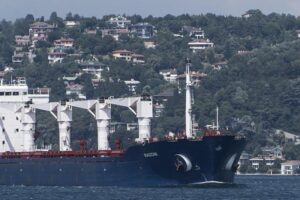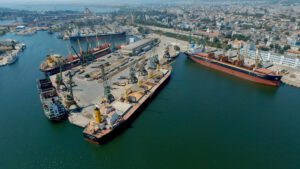
The Joint Coordination Centre (JCC) authorized five outbound vessels loaded with food on Thursday within the framework of the Black Sea Grain Initiative, the UN has reported.
“JCC authorized the movement of five ships carrying a total of 83,241 tonnes of grain and other foodstuffs as part of the Black Sea Grain Initiative,” the UN said.
The UN reported that vessels Jasmin Queen (9,531 tonnes of corn), Captain Adam 1 (9,300 tonnes of wheat) and Filyoz (4,410 tonnes of sunflower oil) will go to Turkey. The Kiran America ship will head to China with 50,000 tonnes of barley and corn, while the Santana ship will deliver 10,000 tonnes of wheat to Italy.
In addition, vessel Dignity (8,200 tonnes of sunflower seeds) previously postponed the departure from the port of Chornomorsk to Thursday, September 8. It is planned that it will go to Turkey.
“As of September 7, the total tonnage of grain and foodstuffs exported from the three Ukrainian ports is 2.335 million tonnes. In total, the movement of 211 ships has been authorized at the moment – 111 inbound and 100 outbound,” the UN said.
In Istanbul on July 22, with the participation of the UN, Ukraine, Turkey and Russia, two documents were signed on the creation of a corridor for the export of grain from three Ukrainian ports – Chornomorsk, Odesa and Pivdenny.
Black Sea Grain Initiative, CHINA, ITALY, SHIPS, TURKEY, Ukrainian food

A convoy of four ships loaded with food departed from two Ukrainian ports on Wednesday, the Anadolu agency said with the reference to the Turkish Defense Ministry.
The ships, carrying sunflower oil, oil cake and corn, sailed out of Odesa and Chornomorsk, the ministry said.
On July 22, Russia, Turkey, Ukraine and the United Nations signed two documents to create a corridor for grain exports from three Ukrainian seaports: Chornomorsk, Odesa and Pivdenny. The parties also established the joint coordination center monitoring food supplies that brings together representatives of Russia, Turkey, Ukraine and the UN.
In all, 25 ships loaded with food have departed from Ukrainian ports since August 1 consistent with the agreement.

Five ships loaded with grain, including corn and wheat, departed Ukrainian ports on Tuesday, the Anadolu news agency reported with reference to the Turkish Defense Ministry.
Two ships left Pivdenny port and three others Chornomorsk port, it said.
The Joint Coordination Center in Istanbul is also set to inspect four vessels en route for Ukraine to be loaded with grain on Tuesday.
Participants in four-sided negotiations (the United Nations, Russia, Turkey, and Ukraine) signed two documents in Istanbul on July 22 regulating the functioning of a sea corridor for exporting grain from the Ukrainian seaports of Odesa, Chornomorsk, and Pivdenny.

The opportunity to use all three seaports of Big Odesa within the framework of the Istanbul Grain Initiative will help increase transshipment volumes to three or five vessels a day within two weeks, Infrastructure Minister Oleksandr Kubrakov has said.
“Our goal is to increase transshipment in ports. Within two weeks we plan to reach the transshipment volume of three or five vessels per day,” the Ukrainian Sea Ports Authority (USPA) quoted him as saying in connection with the departure of the first vessel from the port of Pivdenny – Sacura with 11,000 tonnes of soybeans for Italy on Monday.
Earlier, as part of the grain initiative, eight vessels with corn, sunflower seeds and sunflower oil with a total tonnage of over 250,000 tonnes left the ports of Odesa and Chornomorsk. Four of them with 84,500 tonnes have already arrived in Istanbul and have been or are being tested by the Joint Coordination Center.
Together with the vessel Arizona, which also left Chornomorsk for Turkey on Monday, carrying 48,500 tonnes of corn, the total number of vessels reached 10, and their tonnage was about 310,000 tonnes.
In addition, within the framework of the Istanbul Grain Initiative, the first vessel for loading since the beginning of the war has already arrived in the Ukrainian port on August 7, and the second on the same day was inspected by the Joint Coordination Center near Istanbul.
“We are working with the guarantors of the agreements so that the grain corridor works smoothly and all the requirements for shipping are met,” Kubrakov said.

The departure of three dry cargo ships with grain and food from Ukrainian ports is scheduled for August 5, Minister of National Defense Hulusi Akar said, Turkish Anadolu agency reports.
According to the agency, Akar held separate talks with Ukrainian Defense Minister Oleksiy Reznikov and Infrastructure Minister Oleksandr Kubrakov. The issues of grain transportation were discussed at the talks.
In addition, the vessel is also expected to be checked and sent from Istanbul for loading in Ukraine, the Turkish Defense Minister said.
The Ukrainian authorities have not yet announced the departure of the courts on August 5.
On July 22, in Istanbul, with the participation of the UN, Ukraine, Russia and Turkey, two documents were signed on the creation of a corridor for the export of grain from three Ukrainian ports – Chornomorsk, Odessa, Pivdenny.
On August 1, the vessel Razoni with 27 thousand tons of corn left the port of Odessa under the flag of Sierra Leone and is heading for Lebanon.

As part of EU sanctions, the Bulgarian authorities imposed a ban on entry into their ports for ships from Russia, the Associated Press (AP) reported on Sunday.
“All ships flying the Russian flag, as well as ships that changed the Russian flag or registration to any other state after February 24, are denied access to the sea and river ports of Bulgaria,” AP quotes excerpts from a statement by the Bulgarian Maritime Administration.
AP specifies that the Bulgarian authorities will make an exception for ships in distress or in need of humanitarian assistance, as well as ships carrying energy, food and medicine to the EU.
On the eve it became known about a similar order of the Italian authorities. At the same time, Russian cargo ships, which are currently in Italy, were ordered by the authorities to go to sea as soon as they complete their current operations.
Earlier in April, the EU introduced another package of sanctions against the Russian Federation, ordering, in particular, to close ports for ships from Russia. At the same time, exceptions are provided for the transportation of a number of goods, for example, energy carriers, agricultural products.